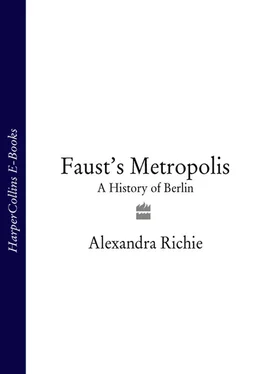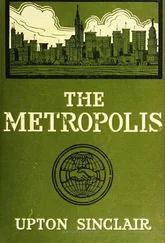In keeping with racial Darwinism and other such theories many Germans now believed that civilization in Europe had moved from the ‘superior’ west to the ‘inferior’ east. Of course such ideas were not unique to Germany; in Britain they were reflected in the colonial policies of the Victorian age, and many nations throughout the nineteenth century created equally chauvinistic accounts of their own superiority. But while internal prejudice was being increasingly channelled into rising anti-Semitism, the external foe was seen to lie in the Slavic lands to the east. Negative views of ‘the Slavs’ were widespread in nineteenth-century Prussia. Friedrich Engels was voicing a popular view when he wrote that ‘all these [Slavic] peoples are at the most diverse stages of civilization, ranging from the fairly highly developed (thanks to the Germans ) modern industry and culture of Bohemia down to the almost nomadic barbarism of the Croats and Bulgarians’. 94All Slavs were ‘inferior’, but for Berliners the most contemptible group were their neighbours – the Poles.
The vast borderlands between Germany and Poland have long been one of the most controversial regions of Europe. The lines between them have constantly shifted, leaving mixed populations on one or other side and, despite claims and counter-claims by both nations, there is not and never has been anything like a simple clear-cut historical border to divide the two. The mutual contempt was not merely the result of a long and troubled history but had to do with contemporary questions of political power. The Prussians, with Austria and Russia, had erased Poland from the map in 1795. Germans were taught that the re-creation of a Polish state would result in unacceptable losses to the Prussian – German eastern frontier, and instead of responding to legitimate demands for Polish independence they had tried to Germanize the Prussian-Polish lands through the Kulturkampf and through special bodies created to oversee German colonization; these measures included the prohibition of the use of the Polish language in schools and the purchase of Polish estates for German settlers. 95And yet, to Bismarck’s chagrin, Polish cultural and economic bodies were so well organized that despite his concerted efforts there was little decline in use of the Polish language or in the ownership of land. Worse still, his measures seemed to have intensified a sense of Polish national consciousness.
Berlin’s history was rewritten at a time when Germans felt threatened by this increasing tide of Polish nationalism and when words like ‘Wend’, ‘Slav’ and ‘Pole’ were increasingly – and incorrectly – used interchangeably. Late nineteenth-century Germans were bombarded with images of Slavs as a chaotic people whose towns and villages were primitive and dirty compared with their pristine German counterparts. Poles were commonly portrayed as devious and untrustworthy and incapable of governing themselves. Why, it was asked, should Germany allow the creation of a Polish state which would merely collapse into anarchy? Furthermore, Engels’s view that all civilization, culture, progress and advancement in the Polish lands had ultimately been introduced by Germans was widely believed. One of the most pervasive themes in popular history was the notion of the Drang nach Osten : the ancient German ‘mission in the east’ was viewed as one of the crowning achievements of European history. Wilhelm Jordan was typical when he asked: ‘Are not the Germans more important and more difficult to replace from the perspective of the progressive development of the human race than the Poles?’ 96Furthermore it was argued that this was not a modern phenomenon; archaeology and ancient history could ‘prove’ that the Slavs had ‘always’ been comparatively primitive. Ancient Germanic villages could be identified because they were neat and technologically advanced, whereas Slavic ones were crude and disorganized. The archaeologist Wilhelm Unversagt, who carried out excavations between the Oder and the Elbe, said of one Slav fortress:
The domestic and defensive buildings were constructed in the most primitive block-technique … when one recalls that such houses appear in the residences of Slav princes, and at a time when the imposing Romanesque churches were built on the Rhine and in central Germany, which even today arouse our highest admiration, one can understand what the culturally superior Germanic West had to give to the primitive Slavic East. 97
These ‘scientific’ and ‘scholarly’ views provided fertile ground for the National Socialists in 1933.
The process of rewriting Berlin history was intensified in the 1930s, when it became a tool of Nazi state policy through the work of bodies such as Walter Frank’s Reichsinstitut für die Geschichte des neuen Deutschlands (the Institute for the History of New Germany) and the work of eminent men like Erich Marcks, Fritz Hartung and Heinrich von Srbik. And it was then that a concerted attempt was made to thoroughly ‘Germanize’ Berlin’s history. Positive references to Jews, Slavs and other ‘undesirable groups’ were simply erased. In the 1936 article ‘What All Berliners Must Know About Their History’ Dr Hermann Rügler, the head of the Institute for the History of Berlin, wrote that ‘Berlin was from the very beginning to the present day a German city’. He acknowledged that although there had been a period of Slavic settlement this had been ‘insignificant’, as Germans had quickly resettled the altes deutsche Stammesgebiet – the old German ancestral area. He claimed that there was plenty of archaeological evidence of early Germanic settlements in the region but that the ‘few Wendish finds’ revealed that the Slavs had merely ‘existed – nothing more’. The 1937 Nazi publications for Berlin’s official birthday boasted that the city was indeed ‘founded on good Germanic soil’, and the mention of the city’s Slavic past disappeared from the 1937 Baedeker. 98 In short, Berliners were taught that although there had been a brief period of ‘illegitimate’ Slavic settlement in a Germanic area, these people had contributed nothing to the history of the city. The message was as powerful as it was sinister. If the medieval Germans had been right to retake the ‘true German’ areas around Berlin and if the Slavs were not worthy of inhabiting ‘German soil’, why should this end in the Mark Brandenburg? 99The same arguments were quickly extended to whip up support for the retaking of ‘true German’ cities like Danzig. As early as 1936 the Nazi version of the history of Berlin had become a handmaiden to the war effort.
The denial of the Slavic heritage became the first great myth of Berlin historiography. It was pathetic – rather as if the British had tried to deny the Norman Conquest – but the extraordinary notion that one could use ancient history to legitimate contemporary politics was taken with deadly seriousness. The abuse of early history continued even after the war and not only by the Germans; the ludicrous assumption that the ancient Wends were in fact Polish was used by some Polish extremists in 1945 to claim that because Slavs had at one time lived in the Berlin area the city should become part of Poland. 100Nevertheless the most blatant abuses in the early history of the Mark Brandenburg were corrected after the war, and the Wends were finally given their rightful place as one of the many groups who had lived in and contributed to the long and complex history of the city of Berlin.
Such considerations were of course irrelevant to the Berliners of the fifteenth century. The city was still small and insignificant and paled in comparison to Paris or London, Amsterdam or even Rome, where Cardinal Odoardo Farnese could hear twenty-seven languages spoken in the refectory of the Jesuit college in the Piazza Altieri. Berlin still had nothing to compare with the marvels of the rest of Europe, whether in the Vladislav Hall in Prague or the Palazzo Vecchio in Florence or the magnificent guild hall of Ypres. But Berlin was now firmly in the grip of the Hohenzollern family and was about to be pushed on to the world stage. In the coming years it would undergo a transformation so profound that it would become one of the most important and powerful cities in Europe. It would be a traumatic birth.
Читать дальше












